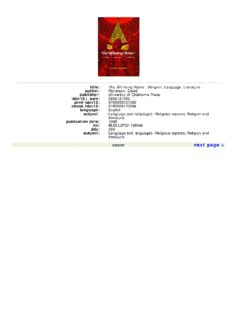
The Affirming Flame: Religion, Language, Literature PDF
Preview The Affirming Flame: Religion, Language, Literature
cover next page > title: The Affirming Flame : Religion, Language, Literature author: Patterson, David. publisher: University of Oklahoma Press isbn10 | asin: 0806121092 print isbn13: 9780806121093 ebook isbn13: 9780806170046 language: English subject Language and languages--Religious aspects, Religion and literature. publication date: 1988 lcc: BL65.L2P38 1988eb ddc: 200 subject: Language and languages--Religious aspects, Religion and literature. cover next page > < previous page page_ii next page > < previous page page_iii next page > Page iii The Affirming Flame Religion, Language, Literature By David Patterson University of Oklahoma Press: Norman and London < previous page page_iii next page > < previous page page_iv next page > Page iv By David Patterson Faith and Philosophy (Washington, D.C., 1982) (Translator) Confession, by Leo Tolstoy (New York, 1983) (Translator) The Forged Coupon, by Leo Tolstoy (New York, 1984) (Translator) Diary of a Superfluous Man, by Ivan Turgenev (New York, 1984) The Way of the Child (Houston, 1988) (Translator) Winter Notes on Summer Impressions, by F. M. Dostoevsky (Evanston, Ill., 1988) The Affirming Flame (Norman, 1988) Library of Congress Cataloging-in-Publication Data Patterson, David. The affirming flame: religion, language, literature / by David Patterson. 1 st ed. p. cm. Bibliography: p. Includes index. ISBN 0-8061-2109-2 (alk. paper) 1. LanguagesReligious aspects. 2. Religion and literature. 1. Title. BL65.L2P38 1988 200dc19 87-30026 CIP The paper in this book meets the guidelines for permanence and durability of the Committee on Production Guidelines for Book Longevity of the Council on Library Resources, Inc. Copyright © 1988 by the University of Oklahoma Press, Norman, Publishing Division of the University. Manufactured in the U.S.A. First edition. < previous page page_iv next page > < previous page page_v next page > Page v FOR MY PARENTS < previous page page_v next page > < previous page page_ii next page > < previous page page_vii next page > Page vii CONTENTS Preface ix 1. Opening Remarks: Why Religion, Language, Literature? 3 Part One: Literary Logos and Literary Criticism 19 2. The Johannine Logos and Literary Criticism 21 3. Lacan's Parole and the Literary Critic 37 4. Dostoevsky's Dvoinik per Lacan's Parole 58 Part Two: Religious Concepts of Language and Literature 75 5. Mikhail Bakhtin and the Dialogical Dimensions of the Novel 77 6. The Apotheosis of Presence: Buber, Wiesel, and Hasidism 93 Part Three: Messianic Elements of Language and Literature 115 7. Messianic Aspects of the Child in the Works of Elie Wiesel 117 < previous page page_vii next page > < previous page page_viii next page > Page viii 8. Paltiel's Quest for the Messiah in Wiesel's The Testament 135 9. Conclusion 152 Notes 159 Select Bibliography 169 Index 173 < previous page page_viii next page > < previous page page_ix next page > Page ix PREFACE In these chapters I attempt to develop a few strands of thought to establish some integration and interrelation of religion, language, and literature. Focusing on the selected particulars represented in this volume, I set out to offer the reader a general sense of the religious dimensions of language and literature, the linguistic elements of religion and literature, and the literary aspects of religion and language. The religious tradition I draw most upon is Judeo-Christian, and I draw upon only a small portion of that tradition. If it seems that I indulge in a curious interplay of Judaism and Christianity and at times lump some of their ideas together, it is because I am more concerned with how they are joined according to the spirit than with how they are separated according to the letter. I harbor no illusions about the distance between the vast horizons of this book's subject and the modest scope of its treatment. At best, I but scratch a few surfaces. My hope, however, is that in scratching those surfaces I may plant some seeds that will grow and thus bring something up from the depths and into the light. As for the soil in which these seeds are planted, philosophers of religion, philosophers of language, literary critics, and literary theorists might find these chapters of interest. Certainly among the people in my audience will be those who have a concern for the ties that bind religion, language, and literature, and that could include a good number and variety of thinkers. To be sure, the three < previous page page_ix next page > < previous page page_x next page > Page x areas cited in the book's title pervade our intellectual, spiritual, and emotional existence; for religion is the soul, language the substance, and literature the song of life. Finally, on a formal note, it should be pointed out that, unless indicated otherwise, all translations are my own. I would also like gratefully to acknowledge two periodicals, which published earlier versions of two of the chapters in this book. Chapter 4 is based on the article "Dostoevsky's Dvoinik per Lacan's Parole," which appeared in Essays in Literature, 10 (Fall 1983), 299307, and Chapter 5 is based on "Mikhail Bakhtin and the Dialogical Dimensions of the Novel," which was published in the Journal of Aesthetics and Art Criticism, 44 (Winter 1985), 13139. DAVID PATTERSON STILLWATER, OKLAHOMA < previous page page_x next page >
